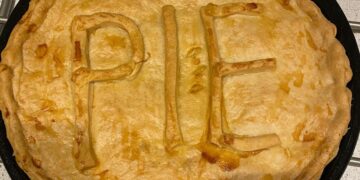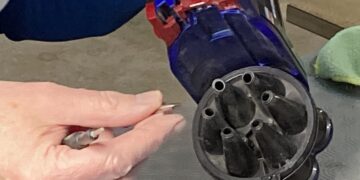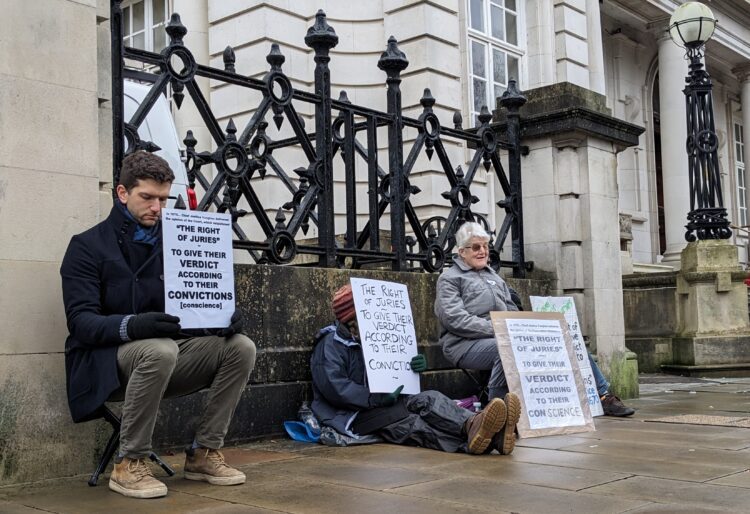A GROUP campaigning for the preservation of jury equity is staging its latest protest in Reading today, Friday, April 19.
Defend Our Juries is holding a sit-in protest outside Reading Crown Court today as part of its continued campaign against what it argues is the eroding of the right of jurors to acquit a defendant on matters of principle.
Protestors will hold up signs depicting the inscription on a stone in the Old Bailey, which explains the principle of jury equity
They will be joining thousands across the country in taking action today, as the permission hearing for Trudi Warner is heard in the Royal Courts of Justice.
Warner, 68, was prosecuted for contempt of court after holding up a sign explaining the right of juries to acquit outside Inner London Crown Court last March.
In a statement from Defend Our Juries, the group argued that: “By displaying these signs the group are showing the ridiculous nature of the prosecution against Trudi Warner.
“Countless thousands of pounds of public money have been spent pursuing a pensioner for showing a sign that is literally on display inside the Old Bailey
Nullification is just one of the things that a number of defendants have been barred from explaining as part of their defence by the Court of Appeal.”
Jury equity, or nullification, is an option available to jurors to acquit in spite of the directions given by the judge, even if they are directed that there is no available defence.
Nullification is a way of declaring a defendant is not guilty, even if the law suggests they should be, and has been used to exonerate those exposing government dishonesty.
While it is not enshrined in law explicitly, it is the result of two other principles: that jurors cannot be punished for passing an ‘incorrect’ verdict, and that an acquitted defendant cannot be retried for the same offence.
The rulings also meant that some defendants were unable to give legal defences about their actions, including climate activists who were barred from explaining their actions to juries by describing climate change and fuel poverty.
Known as the “consent” defence, those accused of criminal damage could argue that property owners would have consented to damage had they known about the circumstances, and hence the cause, of that damage.
Protestors successfully used this defence in 2023 in a case which saw nine people who targeted the London headquarters of the HSBC Bank acquitted of smearing paint on the building, as well as those of a number of political parties.
Attorney General Victoria Prentis then issued an appeal on the consent defence, which has been a part of British law since 1971.
The appeal was accepted, and judges ruled last month that the defence would no longer be admissible in court.
The lady chief justice of England and Wales, Sue Carr, said that political or philosophical views were “too remote” to provide a lawful excuse defence.
The defence became a tool used by climate protestors in court as a result of other restrictions about what explanations they could give in court.
Defend Our Juries is also protesting these restrictions, which were seen in a string of cases involving Insulate Britain activists at the Inner London Crown Court.
Three of those accused, Giovanna Lewis, Amy Pritchard, and David Nixon, were sentenced to jail time early last year for addressing the jury to explain that climate change was a motivator of their actions.
Judge Silas Reid, who presided over the cases, argued that the point of the trials was not to decide whether the defendants’ actions were moral, only whether their peaceful protests had caused a nuisance or not; that motivation had no relevance to the case.
He told the defendants that the reasons for their actions were “for history to judge, not the jury” – a move which one of the defendants argued effectively “criminalised” the mention of the climate crisis.
Many argue that protestors’ explanation to the jury has led to a jury nullification despite legal directions suggesting that they were guilty of the crime.
Defend Our Juries has laid out three main aims for its action: to bring to the attention of the public an effort to undermine trial by jury, to raise awareness of a constitutional “safeguard” in the acquittal of the accused as a matter of conscience, and to ensure defendants have an opportunity to explain their actions, including motivation and beliefs.
Following the case of Trudi Warner, protestors are putting themselves at risk of prosecution by holding up the sign.
Tony Goodchild, from Reading, is among those participating in the protest, and said: “I am sitting here because I believe the moral law is stronger than an unjustly applied law, and juries must be free to express that in their verdicts.”
More information about the Defend Our Juries campaign is available via: defendourjuries.org














































